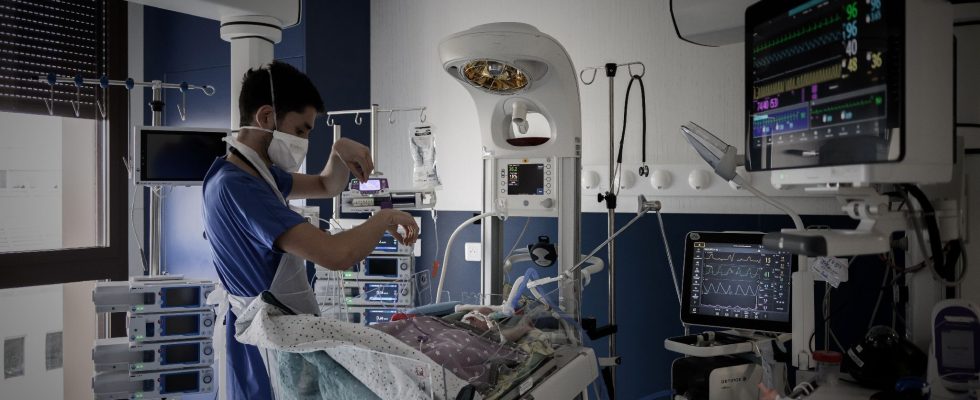A preventive treatment for bronchiolitis intended for newborns, Beyfortus (Sanofi/AstraZeneca), will be available “from mid-September” in health establishments and pharmacies (on order), indicated the Ministry of Health in a document sent to healthcare professionals. This monoclonal antibody (nirsevimab) is one of the options against the respiratory syncytial virus, the main cause of bronchiolitis (60 to 90% of cases) in infants during their first season of exposure to RSV.
Beyfortus received European marketing authorization in October 2022. “Available from mid-September in health establishments and on order in community pharmacies, nirsevimab can be prescribed to all infants born from February 6, 2023 in mainland France”, it is specified in the ministry document. For the Overseas Territories, the “specificities […] are under investigation”.
“Its active ingredient, nirsevimab, is a long-acting monoclonal antibody, capable of neutralizing RSV in the event of contamination. More precisely, it inhibits the membrane fusion stage in the viral penetration process,” details the specialized site. Vidal. To support healthcare professionals, the High Authority for Health (HAS) plans to distribute a series of rapid responses relating to the use of nirsevimab during the month of September. At the microphone of BFM TVDr Aurel Guedj, emergency doctor at Ambroise-Paré hospital (AP-HP), specified that this injection did not work like a vaccine: “There, we directly inject antibodies. We do not teach the system to protect, but we give him the weapons to defend himself.”
How will it be administered? The single injection, into the muscle, can be done in certain cases at birth. For infants born from September 15, it is recommended that they be “immunized before leaving the maternity ward”, the ministry informed caregivers. Beyfortus comes in a pre-filled syringe, to be stored in the refrigerator. To adapt to dosage recommendations, two dosages are offered: 50 mg or 100 mg. Note that the injection can be concomitant with an infant vaccination, at a separate site.
Front line pharmacies
The antibody can also be administered in town, in general medicine, pediatric offices, health centers, etc. In this case, “a prescription will be required from the doctor who follows the child, according to the ministry document. The parents will then go to a community pharmacy to order and then collect the medication which will be made available by the State, without family billing. A state stock is made available to community pharmacies. Delivery time after ordering is 3 to 4 days, and up to 5 or 6 days on weekends. Still according to the General Directorate of Health, which spoke to BFMTV, a contract was signed with the Sanofi laboratory for a first delivery of 200,000 doses for this year.
On the subject of Beyfortus, a letter to health professionals was written by the National Agency for the Safety of Medicines and Health Products (ANSM). “Like any medicine, Beyfortus can cause side effects. Although uncommon, these potential side effects are: rash, reaction at the injection site (induration, swelling and pain), fever, she explains. These side effects are not serious and can appear up to a few days after the injection. They are generally mild or moderate in intensity and short-lived.”
But what about its effectiveness? “We hope, given the results of the studies, that there will be an effectiveness close to 80 to 85% on serious bronchiolitis,” assured Christophe Batard, pediatrician in Vincennes, still on BFMTV. Same enthusiasm for Professor Christèle Gras-Le Guen, pediatrician and head of the women’s mother child center at Nantes University Hospital. “We are potentially experiencing a historic moment for the treatment of bronchiolitis. The Beyfortus treatment will make it possible to effectively protect children throughout the winter season and therefore limit the impact of this epidemic in health establishments that have until now been particularly mobilized by the epidemic”, she wrote in a communicated.
In France, it is estimated that bronchiolitis affects nearly 30% of infants under two years old each winter, or around 480,000 cases per year. And 2 to 3% of infants under one year old are hospitalized for severe bronchiolitis. In France, the epidemic reached an unprecedented level last winter for more than ten years: it required more than 26,000 hospitalizations after a visit to the emergency room among children under two years old, according to numbers from emergency services. “This season, the epidemic was characterized by a very high intensity, almost twice higher than the average values of reference epidemics,” continued the surveillance report from Public Health France published in July 2023.
In France, respiratory syncytial virus (RSV) bronchiolitis is one of the leading causes of hospitalization of infants under one year old during the winter season. In addition to an information campaign on bronchiolitis intended for parents, the deployment of preventive treatment against bronchiolitis will constitute “one of the major challenges of the start of the school year”, declared the new Minister of Health, Aurélien Rousseau, at the beginning of August.
